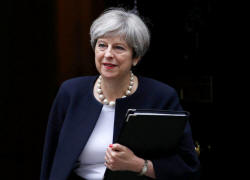|
Launching gig economy
review, Britain's May hopes to regain authority
 Send a link to a friend
Send a link to a friend
 [July 11, 2017]
By Costas Pitas and William James [July 11, 2017]
By Costas Pitas and William James
LONDON (Reuters) - Prime Minister Theresa
May will try to wrest back control of Britain's political agenda on
Tuesday by unveiling proposals to protect workers in the "gig economy"
in a direct challenge to opposition parties.
May wants to signal that it is business as usual for her government
after an ill-judged election gamble damaged her authority and threw away
her governing Conservatives' majority in parliament, emboldening the
main opposition Labour Party.
She hopes that the launch of the review into employment practices which
she ordered shortly after becoming prime minister almost a year ago will
re-set her agenda and show that her pledge to help those Britons who are
"just about managing" is more than just a slogan.
The review, compiled by Chief Executive of The Royal Society of Arts
Matthew Taylor, calls for a new category of worker called a "dependent
contractor" meaning that those Britons working for companies such as
taxi app Uber and takeaway food courier Deliveroo would receive more
benefits.
"While avoiding overbearing regulation, we will make sure people have
the rights and protections they need," May will say.

May will challenge her political rivals to "contribute, not just
criticise" her plans - a move reflecting both her need for help to pass
reforms through parliament, and her resolve to press ahead despite
questions about her future as leader.
More and more people are working for apps in fast-growing sectors such
as takeaway delivery and taxi services, and while wanting the
flexibility such work offers, some say they are left without the
protection that workers in more traditional forms of employment receive.
Last year, judges sided with two self-employed drivers at Uber, who had
argued that they deserve workers' rights such as the minimum wage, in a
move which would add to the San Francisco-based firm's costs, prompting
it to appeal.
In Britain, the self-employed have no entitlement to employment rights
beyond basic health and safety and anti-discrimination laws.
[to top of second column]
 |

Britain's Prime Minister Theresa May leaves Downing Street, London,
Britain July 11, 2017. REUTERS/Peter Nicholls

Regular workers, by contrast, receive entitlements such as annual leave,
rest breaks and the minimum wage.
The report suggested an employment category be created known as
"dependent contractors" with an eye on those working for platforms such
as apps.
Firms will also have to prove that a person working for them is able to
earn at least 1.2 times the national living wage, which stands at 7.50
pounds ($9.65) an hour for the over-25s, the BBC reported on Monday.
"We need to provide additional protections for this group and stronger
incentives for firms to treat them fairly," according to the report.
"The best way to achieve better work is not national regulation but
responsible corporate governance, good management and strong employment
relations within the organization."
But in advance of the report's release, Britain's biggest union Unite
said it was up to businesses to enforce workers' rights and the
government needed to make sure entitlements were upheld.
May hopes the report will woo working class voters, but the opposition
Labour said it did little more to highlight their record of "failing
working people".

"Put simply, today's Taylor Report shows that Theresa May is failing
working people across the country," said Rebecca Long-Bailey, Labour's
business spokeswoman.
"If they were serious about workers' rights they are welcome to borrow
from Labour's manifesto."
(Writing by Elizabeth Piper, Costas Pitas and William James; Editing by
Richard Balmforth)
[© 2017 Thomson Reuters. All rights
reserved.] Copyright 2017 Reuters. All rights reserved. This material may not be published,
broadcast, rewritten or redistributed. |